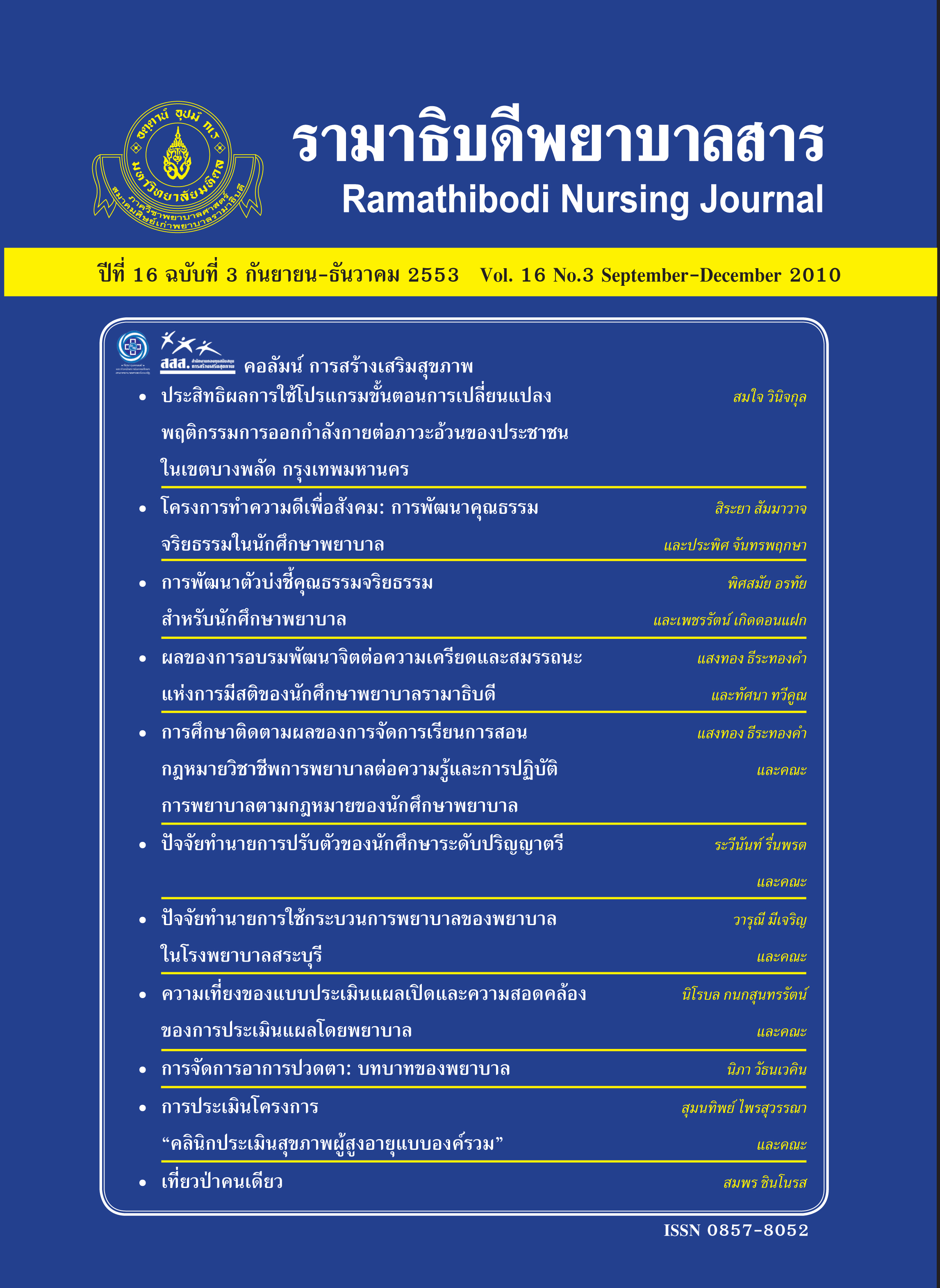ประสิทธิผลการใ ้โปรแกรมขั้นตอนการเปลี่ยนแปลงพฤติกรรมการออกกำลังกาย ต่อภาวะอ้วนของประ นในเขตบางพลัด กรุงเทพมหานคร
Main Article Content
Abstract
บทคัดย่อ
การศึกษาครั้งนี้เป็นการวิจัยการวิจัยกึ่งทดลอง (quasi-experimental research) เพื่อเปรียบเทียบความรู้เรื่องการออกกำลังกาย การรับรู้ความสามารถตนเองในการออกกำลังกายการรับรู้ประโยชน์ของการออกกำลังกาย และค่าดัชนีมวลกาย ก่อนและหลังการทดลอง ระหว่างกลุ่มควบคุมที่ออกกำลังกายตามปกติ กับกลุ่มทดลองที่ได้รับโปรแกรมการเปลี่ยนแปลงพฤติกรรมการออกกำลังกาย โดยอาสาสมัครสาธารณสุข จำนวน 3 คน ที่เข้ารับการอบรมและปฏิบัติกิจกรรมตามโปรแกรม กลุ่มตัวอย่าง คือ ประชาชนที่มีอายุ 20 ปีขึ้นไปที่มีภาวะอ้วน โดยมีดัชนีมวลกายเท่ากับหรือมากกว่า 25 กิโลกรัม/เมตร2 อาศัยอยู่ในชุมชนเขตบางพลัด กรุงเทพมหานครผู้วิจัยจับฉลากได้ ชุมชนสวนปรกเข้ากลุ่มทดลอง และชุมชนวัดศิริไอยสวรรค์เข้ากลุ่มควบคุมกลุ่มตัวอย่างแต่ละกลุ่มมี 30 คน โดยได้จับคู่กลุ่มทดลองและกลุ่มควบคุมให้มีความใกล้เคียงกันให้มากที่สุดด้าน เพศ อายุ ระดับการศึกษา และค่าดัชนีมวลกาย เครื่องมือที่ใช้ในการวิจัย ได้แก่แบบสอบถาม ความรู้เรื่องการออกกำลังกาย การรับรู้ความสามารถตนเองใน การออกกำลังกายและการรับรู้ประโยชน์ของการออกกำลังกาย ระยะเวลาศึกษาตั้งแต่ธันวาคม 2552–มีนาคม 2553การเก็บรวบรวมข้อมูล 2 ครั้ง คือ ก่อนเริ่มโปรแกรมและหลังโปรแกรมสิ้นสุด วิเคราะห์ข้อมูลโดยสถิติบรรยาย สถิติ paired t-test และ independent t-test ผลการศึกษา พบว่า คะแนนเฉลี่ยความรู้เรื่องการออกกำลังกาย การรับรู้ความสามารถตนเองในการออกกำลังกาย การรับรู้ประโยชน์ของการออกกำลังกายของผู้ที่มีภาวะอ้วนหลังได้รับโปรแกรมขั้นตอนการเปลี่ยนแปลงพฤติกรรมการออกกำลังกายมากกว่าก่อนได้รับโปรแกรมฯ และมากกว่ากลุ่มควบคุมที่ออกกำลังกายตามปกติอย่างมีนัยสำคัญทางสถิติ และค่าเฉลี่ยดัชนีมวลกายของผู้ที่มีภาวะอ้วนหลังได้รับโปรแกรมขั้นตอนการเปลี่ยนแปลงพฤติกรรมการออกกำลังกาย ลดลงมากกว่าก่อนการได้รับโปรแกรมฯและลดลงมากกว่ากลุ่มควบคุมที่ออกกำลังกายตามปกติอย่างมีนัยสำคัญทางสถิติ ดังนั้น จึงควรมีการนำโปรแกรมขั้นตอนการเปลี่ยนแปลงพฤติกรรมการออกกำลังกายไปใช้ในการส่งเสริมให้ผู้ที่มีภาวะอ้วนได้มีการออกกำลังกายเพื่อควบคุมน้ำหนัก และค่าดัชนีมวลกาย ซึ่งเป็นส่วนหนึ่งในการส่งเสริมสุขภาพและลดปัจจัยเสี่ยงต่อโรคเรื้อรังที่สำคัญ
คำสำคัญ : ภาวะอ้วน, ค่าดัชนีมวลกาย, โปรแกรมขั้นตอนการเปลี่ยนแปลงพฤติกรรม การออกกำลังกาย
Abstract
The purpose of this quasi-experimental research using the two grouppretest–posttest design was to compare knowledge of exercise, perceived selfefficacyin exercise, perceived benefit of exercise, and body mass index among obesepeople in the community of Bangplat District, Bangkok Metropolitan. Purposivesampling was used to recruit a sample of people who were at least 20 years old andhad a body mass index of 25 Kg/m2. Two communities were randomly selected toparticipate in the study. Suanprok community served as the experimental group, whileWat Siriaisawan community served as the control group. Thirty subjects wererecruited from each community, resulting in a total sample of 60 persons. Participantswere matched by gender, age, education, and body mass index. The control groupreceived usual exercise, while the experimental group received the program based onthe transtheoretical model. Three health volunteers were selected and trained by theresearcher to implement the program in the experimental group. The instrumentsconsisted of 3 sets of questionnaires, including the Knowledge of ExerciseQuestionnaire, the Perceived Self–Efficacy in Exercise Questionnaire and thePerceived Benefit of Exercise Questionnaire. The questionnaires and exercisebehavior record were used to collect data both before and after the implementation.The duration of this study was from December 2009 to March 2010. Statisticalanalyses were done using descriptive statistics, paired t-test, and independent t-test.It was found that the mean scores of the knowledge of exercise, perceived selfefficacyof exercise, and perceived benefit of exercise of obese people after receivingthe transtheoretical model program were significantly higher than those beforereceiving the program and also significantly higher than those in the control group.The mean of body mass index of obese people after receiving the transtheoreticalmodel program was significantly lower than those before receiving the program andthose in the control group. The results indicated that the exercise program applyingthe transtheoretical model can promote obese people to control their weight and bodymass index, which are important part of health promotion and chronic diseaseprevention.
Keywords : Obesity, Body mass index, Transtheoretical model, Exercise
Article Details
บทความ ข้อมูล เนื้อหา รูปภาพ ฯลฯ ที่ได้รับการตีพิมพ์ในรามาธิบดีพยาบาลสาร ถือเป็นลิขสิทธิ์ของวารสาร หากบุคคลหรือหน่วยงานใดต้องการนำทั้งหมดหรือส่วนหนึ่งส่วนใดไปเผยแพร่หรือเพื่อกระทำการใด ใด จะต้องได้รับอนุญาตเป็นลายลักษณ์อักษรจากรามาธิบดีพยาบาลสารก่อนเท่านั้น


